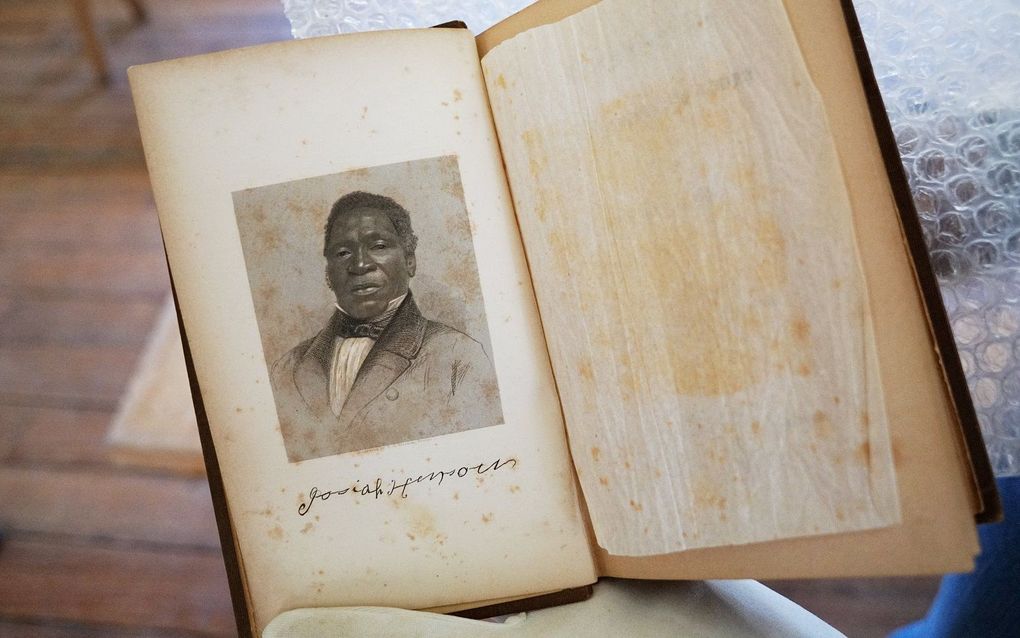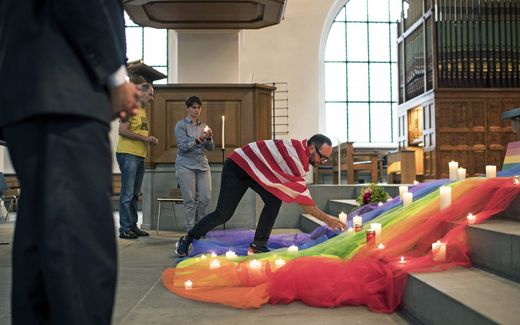Beware of the n-word (and other sensitivities) in old books

A portrait of Josiah Henson in a book he authored, at Josiah Henson Park in Bethesda, Maryland. His life may have inspired the landmark novel "Uncle Tom's Cabin." Photo AFP, Mandel Ngan
Opinion
No more ugly people, fat people, or weird people. Publishers are busy removing all kinds of objectionable things from novels and children's books. But not everyone agrees with that.
"This book may contain offensive language or stereotyping of people or cultures." For which book does the Dutch webshop Bol.com issue this warning? The classic "Uncle Tom's Cabin", the book that used to be called, in some Dutch editions, "Uncle Tom's Negro Cabin".
Many people in our society feel immediate irritation at such an announcement writes Dutch journalist Enny de Bruijn in an opinion article for the Dutch Christian daily Reformatorisch Dagblad. Why should classic books carry reading warnings, and why should signs be placed at statues criticising the hero's views? Why should coloured actors in historical films play white characters or vice versa (the so-called "whitewashing" of the past and the "blackwashing" of today), and why should we retroactively remove from historical texts the words that have been declared taboo in our time?
This irritation has not much to do with the adaptations in words, stories or films per se but with the trend behind them, writes De Bruijn. Many people in our society feel that the world of their youth is disappearing, how a different world is emerging with varying relations of power, culture and morals. Some are happy about this. Others especially feel that the ruling class is quite forcibly imposing the morality it sees as the only right in society and that there is no escape from it.
In a time as moralistic as ours, it is sometimes difficult to still look at the facts soberly and calmly judge the views at issue for their worth and then make up your mind freely. Everything has become fraught with the feeling that there is a culture clash and that you must fight for your opinion, whichever side you are on. Hence, even the latest debate in this area, about books and "sensitivity readers", evokes such fierce reactions.
Fierce debates
Last year, you had first the Roald Dahl issue, then the Ian Fleming issue, and then the Agatha Christie issue. All good for spirited debates in the media, with pitch and feathers flying around at times. What was left of classical texts if you removed all the objectionable things and adjusted everything to today's moral standards? Could you deal with history that way?
The three issues have in common that they are widespread texts known to a wide audience. And that the adaptations mainly concern a variety of words and things that were not meant to be wrong at the time but are perceived as racist or sexist in our current society. Sometimes words are deleted, sometimes a comment is added. For example, the warning comes in books about James Bond: "This book was written at a time when terms and attitudes that might be considered offensive by modern readers were commonplace."
For all those changes and warnings, the argument is: "We don't want to hurt contemporary readers, and if we don't change anything, it will only detract from the book's message." So says Agatha Christie's great-grandson, and so says Astrid Lindgren's grandson. Behind that, there may be another thought: "We are afraid that sales will drop otherwise, and we would like to keep selling as many books as possible." But no one speaks that thought out loud.
So the grandchildren of these famous writers do NOT think that their grandfather's or grandmother's books should be preserved as intact as possible and should never be altered. They do not see those books as museum pieces but as stories that bring a message to the reader, even to today's readers. If the language and culture of the past get in the way of that message, then you have to do something about it.
But, according to De Bruijn, there is another point of view possible: it is good to get to know a world you don't fully identify with or characters you don't fully agree with. You shouldn't want to adjust to the past and close your eyes to reality.
Meanwhile, it helps to realise that the whole discussion is mainly about children's books, school books and novels for the general public. That makes sense, too, because those books are traditionally meant to educate readers and shape their morals. The purpose of such books is not to reproduce (historical) reality as accurately as possible; the purpose is to convey a message. Especially with that kind of book, it is sensitive when language and views do not quite match what you want to impart to your children.
Curses
Christian readers, writers and publishers will fully recognise this because "adapting texts to the reader's sensibilities" is, of course, not unknown in Christian circles, even if we are talking about other sensibilities. Many Christian librarians used to cross out curses in books with a thick black marker. In contrast, many Christian publishers adapted the pictures in translated books to the sensibilities of their supporters.
Those who want to keep the tradition alive for pedagogical use cannot escape adaptations - this insight has long been prevalent in the Christian book world. But the question remains, of course: what is and what is not, and who decides? And how do you avoid rewriting history and imposing your own morality on the past? Our society seems still working on discussing these questions.
Related Articles










